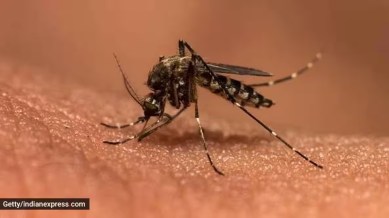Stay updated with the latest - Click here to follow us on Instagram
Mumbai sees significant drop in cases of mosquito-borne illnesses after spike during monsoon
However, doctors have outlined that as the temperature drops in the coming days with the onset of winter, there might be a further increase in cases of viral fever.

Mumbai saw a notable drop in mosquito-borne disease cases between October 1 and 22, as rain in the city subsided after monsoon season. Dengue led the count with 737 cases, closely followed by malaria at 680. Leptospirosis cases numbered 32, and there were 263 cases of gastroenteritis, municipal data showed.
These numbers are less compared to the previous month when the cases were very high amid the monsoon. In September, records indicated a high count of 1,313 malaria cases, 73 cases of leptospirosis, a staggering 1,360 dengue cases, and 573 cases of gastroenteritis.
monthly limit of free stories.
with an Express account.
However, the city has seen a surge in H1N1 (swine flu) cases, according to the BMC health department. In the last 22 days, there have been 51 confirmed cases, an increase from the 18 reported in all of September.
Doctors also outlined that as the temperature drops in the coming days with the onset of winter, there might be a further increase in cases of viral fever.
“The overall cases of monsoon related diseases have dropped in Mumbai. However, there is a slight surge in swine flu cases, especially the H3N2 variant. We have been mapping the active cases and rechecking the vicinity,” said Dr Daksha Shah, executive health officer, BMC.
Meanwhile, the BMC has released a guidance notice aimed at addressing mosquito breeding.
Emphasizing that even minor water accumulations, such as those present in discarded plastic containers or puddles, can serve as breeding sites for mosquito larvae, the municipal body has urged the public to eliminate objects like tin cans, thermocol boxes, and coconut shells, as they tend to collect water.